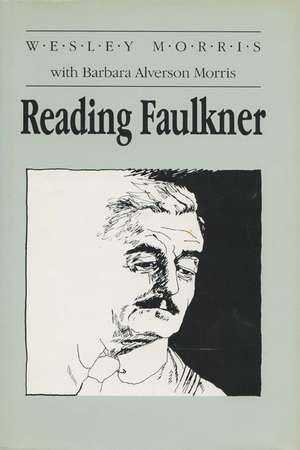Reading Faulkner: Wisconsin Project on American Writers
Autor Wesley Morrisen Limba Engleză Hardback – 14 noi 1989
The general argument advanced by the Morrises in this ambitious work revolves around the idea that William Faulkner is deeply critical of the prevailing Southern myth and discourse; furthermore, that his narratives are an attempt to discover and amplify alternative voices within that dominant milieu. Those voices and the stories they tell are most often those of the unprivileged in race, class, and gender—the black, the poor white, the woman, the neurotic, and so forth—who act out the disintegration of Southern culture even as they may be said to hold it together in a communal act of mythmaking. This “reading” thus makes the case (a largely revisionary one) for Faulkner as a fully engaged political writer, a writer embroiled in the process of the subversion and dissolution not only of dominant Southern myth, but of dominant Southern reality as well. Structured in the way Faulkner imagined his entire fictional universe—as a single narrative—Reading Faulkner’s incremental design results in a “story” that has much of the drive and force of Faulkner’s “story” itself.
Din seria Wisconsin Project on American Writers
-
 Preț: 105.45 lei
Preț: 105.45 lei -
 Preț: 139.62 lei
Preț: 139.62 lei -
 Preț: 88.57 lei
Preț: 88.57 lei -
 Preț: 198.44 lei
Preț: 198.44 lei -
 Preț: 105.18 lei
Preț: 105.18 lei -
 Preț: 130.83 lei
Preț: 130.83 lei -
 Preț: 121.53 lei
Preț: 121.53 lei -
 Preț: 319.66 lei
Preț: 319.66 lei -
 Preț: 146.88 lei
Preț: 146.88 lei - 21%
 Preț: 344.34 lei
Preț: 344.34 lei
Preț: 190.09 lei
Preț vechi: 217.89 lei
-13% Nou
Puncte Express: 285
Preț estimativ în valută:
36.39€ • 39.54$ • 30.58£
36.39€ • 39.54$ • 30.58£
Carte indisponibilă temporar
Doresc să fiu notificat când acest titlu va fi disponibil:
Se trimite...
Preluare comenzi: 021 569.72.76
Specificații
ISBN-13: 9780299122201
ISBN-10: 0299122204
Pagini: 261
Dimensiuni: 165 x 241 x 23 mm
Greutate: 0.6 kg
Editura: University of Wisconsin Press
Colecția University of Wisconsin Press
Seria Wisconsin Project on American Writers
ISBN-10: 0299122204
Pagini: 261
Dimensiuni: 165 x 241 x 23 mm
Greutate: 0.6 kg
Editura: University of Wisconsin Press
Colecția University of Wisconsin Press
Seria Wisconsin Project on American Writers
Recenzii
"Reading Faulkner is one of the most intersesting books on Faulkner to appear in the last decade or more. Its approach is fresh and inventive, its readings of the novels always revealing, and its general conception and contribution to our understanding of Faulkner superior."
—Eric Sundquist, University of California Berkeley
—Eric Sundquist, University of California Berkeley
Notă biografică
Wesley Morris is professor of English at Rice University. He is author of Toward a New Historicism and Friday’s Footprint: Structuralism and the Articulated Text and has published articles on Jacques Lacan, Murray Krieger, Jacques Derrida, and contemporary literary theory. Barbara Alverson Morris is a genealogist and has worked to compile books on the genealogy of her own family as well as others. Together with Wesley Morris, they served as Hanszen College masters, one of the four original colleges of Rice University.
Descriere
The general argument advanced by the Morrises in this ambitious work revolves around the idea that William Faulkner is deeply critical of the prevailing Southern myth and discourse; furthermore, that his narratives are an attempt to discover and amplify alternative voices within that dominant milieu. Those voices and the stories they tell are most often those of the unprivileged in race, class, and gender—the black, the poor white, the woman, the neurotic, and so forth—who act out the disintegration of Southern culture even as they may be said to hold it together in a communal act of mythmaking. This “reading” thus makes the case (a largely revisionary one) for Faulkner as a fully engaged political writer, a writer embroiled in the process of the subversion and dissolution not only of dominant Southern myth, but of dominant Southern reality as well. Structured in the way Faulkner imagined his entire fictional universe—as a single narrative—Reading Faulkner’s incremental design results in a “story” that has much of the drive and force of Faulkner’s “story” itself.
